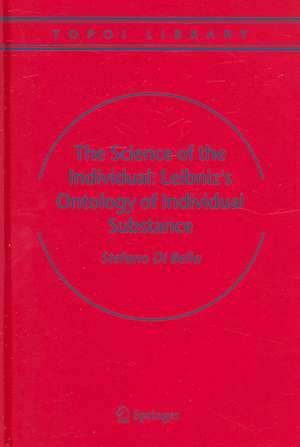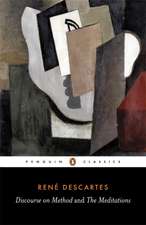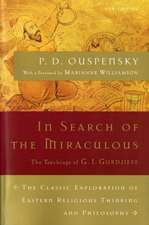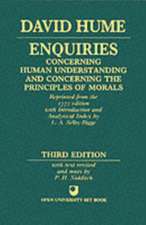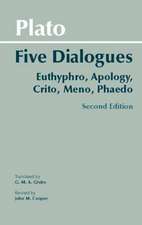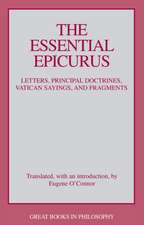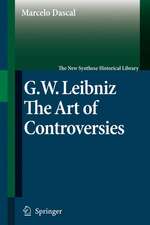The Science of the Individual: Leibniz's Ontology of Individual Substance: Topoi Library, cartea 6
Autor Stefano Bellaen Limba Engleză Hardback – 10 mai 2005
Contrary to what has been commonly accepted, Leibniz’s intuitions are not the mere result of the transcription of subject-predicate logic, nor of the uncritical persistence of some old metaphysical assumptions. They grow, instead, from an unprejudiced inquiry about our basic ontological framework, where logic of truth, linguistic analysis, and phenomenological experience of the mind’s life are tightly interwoven. Leibniz’s struggle for a concept capable of grasping concrete individuals as such is pursued in an age of great paradigm changes – from the Scholastic background to Hobbes’s nominalism to the Cartesian ‘way of ideas’ or Spinoza’s substance metaphysics – when the relationships among words, ideas and things are intensively discussed and wholly reshaped.
This is the context where the genesis and significance of Leibniz’s theory of ‘complete being’ and its concept are reconstrued. The result is a fresh look at some of the most perplexing issues in Leibniz scholarship, like his ideas about individual identity and the thesis that all its properties are essential to an individual.
The questions Leibniz faces, and to which his theory of individual substance aims to answer, are yet, to a large extent, those of contemporary metaphysics: how to trace a categorial framework? How to distinguish concrete and abstract items? What is the metaphysical basis of linguistic predication? How is trans-temporal sameness assured? How to make sense of essential attributions? In this ontological framework Leibniz’s further questions about the destiny of human individuals and their history arespelt out. Maybe his answers also have something to tell us.
This book is aimed at all who are interested in Leibniz’s philosophy, history of early modern philosophy and metaphysical issues in their historical development.
| Toate formatele și edițiile | Preț | Express |
|---|---|---|
| Paperback (1) | 950.66 lei 6-8 săpt. | |
| SPRINGER NETHERLANDS – 28 oct 2010 | 950.66 lei 6-8 săpt. | |
| Hardback (1) | 957.94 lei 6-8 săpt. | |
| SPRINGER NETHERLANDS – 10 mai 2005 | 957.94 lei 6-8 săpt. |
Preț: 957.94 lei
Preț vechi: 1168.21 lei
-18% Nou
Puncte Express: 1437
Preț estimativ în valută:
183.31€ • 192.26$ • 152.60£
183.31€ • 192.26$ • 152.60£
Carte tipărită la comandă
Livrare economică 01-15 aprilie
Preluare comenzi: 021 569.72.76
Specificații
ISBN-13: 9781402032592
ISBN-10: 1402032595
Pagini: 427
Ilustrații: XII, 414 p.
Dimensiuni: 155 x 235 x 26 mm
Greutate: 0.8 kg
Ediția:2005
Editura: SPRINGER NETHERLANDS
Colecția Springer
Seria Topoi Library
Locul publicării:Dordrecht, Netherlands
ISBN-10: 1402032595
Pagini: 427
Ilustrații: XII, 414 p.
Dimensiuni: 155 x 235 x 26 mm
Greutate: 0.8 kg
Ediția:2005
Editura: SPRINGER NETHERLANDS
Colecția Springer
Seria Topoi Library
Locul publicării:Dordrecht, Netherlands
Public țintă
ResearchCuprins
Individuals and Concepts at the Origins of Leibniz’s Project.- A World of Individuals: Particularist Ontology.- A World of Concepts: Combinatorial Science and the Individual.- Abstraction and Predication: At the Boundary of Concepts and Things.- Origo Rerum ex Formis.- “Mira res, aliud esse subjectum quam formas seu attributa”.- Modes and Requisites: The Genesis of Finite Things.- Ens Completum: The Emergence of Complete Being.- Series Rerum.- De affectibus: From the Dynamics of Passions to the Series of Substance States.- Subject of Action.- Subject and Time: The Birth of a Continuant.- Interlude.- The Double Root of Truth.- Fundamentum Veritatis.- Conceptual Containment.- Categories (1).- to the Category Tables.- Varietas. Identity for Concepts and Things: The General Framework.- Concepts, Things and the Grammar of Substance.- Complete Concept and Substance.- Complete Concepts.- Conceptual Individuation: Complete Concept and the Identity of Indiscernibles.- Conceptual Individuation: Complete Concept and Transtemporal Identity.- Post-Script. Twenty Years Later: De Volder (and Others) Facing Individual Concept.- Categories (2).- Consequentiae. A Theory of Causal Temporal Order.- Conditions and Inherence: An Ontology for Predication.- The Debate on DM 13: Some Leading Ideas.- Complete Concepts in God and/or in Themselves.- Compactness.- Completeness.- Scientia Dei.- Truthmakers for the Future: Complete Concepts and Future Contingents.- Conditional Truths and Possible Decrees.- Law, Concept and World.- Laws, Worlds and Concepts.- Conceptual Holism. The Individual and His/Her World.- Substances, Concepts and Individual Essences.- Steps for an Ontological Construction.- Complete Beings and Their Concepts.- A New Essentialism.- Analogies for a Strange Concept: CompleteConcepts, Dynamics and Philosophy of Mind.- Building Complete Concepts: Substance- and Concept Structure.- The Quasi-Science of Individuals.- Individual Concepts and the Infinitary Solution.- Individual Concepts and Leibniz’s Metaphysics of History.
Recenzii
"This study is an impressive piece of work which makes a real contribution to our understanding of Leibniz’s theory of individuals. It offers a very illuminating, sophisticated, and scholarly account of tensions and developments in Leibniz’s thinking about these issues. ... It is particularly insightful also about his relations with other philosophers such as Suarez, Descartes, Hobbes and Arnauld." (Nicholas Jolley, University of California, Irvine, Department of Philosophy (editor of the "Cambridge Companion to Leibniz")
Textul de pe ultima copertă
In his well-known Discourse on Metaphysics, Leibniz puts individual substance at the basis of metaphysical building. In so doing, he connects himself to a venerable tradition. His theory of individual concept, however, breaks with another idea of the same tradition, that no account of the individual as such can be given.
Contrary to what has been commonly accepted, Leibniz’s intuitions are not the mere result of the transcription of subject-predicate logic, nor of the uncritical persistence of some old metaphysical assumptions. They grow, instead, from an unprejudiced inquiry about our basic ontological framework, where logic of truth, linguistic analysis, and phenomenological experience of the mind’s life are tightly interwoven. Leibniz’s struggle for a concept capable of grasping concrete individuals as such is pursued in an age of great paradigm changes – from the Scholastic background to Hobbes’s nominalism to the Cartesian ‘way of ideas’ or Spinoza’s substance metaphysics – when the relationships among words, ideas and things are intensively discussed and wholly reshaped.
This is the context where the genesis and significance of Leibniz’s theory of ‘complete being’ and its concept are reconstrued. The result is a fresh look at some of the most perplexing issues in Leibniz scholarship, like his ideas about individual identity and the thesis that all its properties are essential to an individual.
The questions Leibniz faces, and to which his theory of individual substance aims to answer, are yet, to a large extent, those of contemporary metaphysics: how to trace a categorial framework? How to distinguish concrete and abstract items? What is the metaphysical basis of linguistic predication? How is trans-temporal sameness assured? How to make sense of essential attributions? In this ontological framework Leibniz’s further questions about the destiny of human individuals and their history are spelt out.Maybe his answers also have something to tell us.
This book is aimed at all who are interested in Leibniz’s philosophy, history of early modern philosophy and metaphysical issues in their historical development.
Contrary to what has been commonly accepted, Leibniz’s intuitions are not the mere result of the transcription of subject-predicate logic, nor of the uncritical persistence of some old metaphysical assumptions. They grow, instead, from an unprejudiced inquiry about our basic ontological framework, where logic of truth, linguistic analysis, and phenomenological experience of the mind’s life are tightly interwoven. Leibniz’s struggle for a concept capable of grasping concrete individuals as such is pursued in an age of great paradigm changes – from the Scholastic background to Hobbes’s nominalism to the Cartesian ‘way of ideas’ or Spinoza’s substance metaphysics – when the relationships among words, ideas and things are intensively discussed and wholly reshaped.
This is the context where the genesis and significance of Leibniz’s theory of ‘complete being’ and its concept are reconstrued. The result is a fresh look at some of the most perplexing issues in Leibniz scholarship, like his ideas about individual identity and the thesis that all its properties are essential to an individual.
The questions Leibniz faces, and to which his theory of individual substance aims to answer, are yet, to a large extent, those of contemporary metaphysics: how to trace a categorial framework? How to distinguish concrete and abstract items? What is the metaphysical basis of linguistic predication? How is trans-temporal sameness assured? How to make sense of essential attributions? In this ontological framework Leibniz’s further questions about the destiny of human individuals and their history are spelt out.Maybe his answers also have something to tell us.
This book is aimed at all who are interested in Leibniz’s philosophy, history of early modern philosophy and metaphysical issues in their historical development.
Caracteristici
Reinterprets the genesis and significance of Leibniz’s theory of ‘complete being’ and its concept Presents a fresh look at some of the most perplexing issues in Leibniz scholarship Aimed at all who are interested in Leibniz’s philosophy, history of early modern philosophy and metaphysical issues in their historical development
